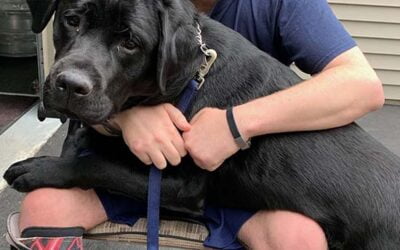Canine Companions for Independence (CCI) has provided trained assistance dogs for children and adults with disabilities since 1975. The world’s largest assistance dog organization, CCI has placed over 4,000 dogs to date. We spoke with Katie Malatino, Public Relations Coordinator of CCI’s Southwest region to learn more.
HNF: Who would benefit from having a canine companion? ![puppyraiser_small[1]](https://www.hnf-cure.org/wp-content/uploads/2013/04/puppyraiser_small1.jpg)
KM: Our recipients are a huge spectrum on every level of physical or developmental disability from age 5 and up.
HNF: In what ways can an assistance dog be helpful to someone with physical limitations such as someone with Charcot-Marie-Tooth (CMT) Disease?
KM: CCI trains four types of assistance dogs to master over 40 specialized commands. The most important thing the dogs do is retrieve. Retrieve is their most go-to command. They are taught a certain number of basic commands according to the individual’s needs. For example, to open a door or even help an individual get out of a car. Dana a 14 year old from Fort Worth has this to say about her assistance dog “It sounds kind of funny, but [my dog] is one of the best listeners I know. She gives me all of her attention!”
HNF: You mentioned four types of assistance dogs. What are they?
KM: There are Service Dogs who assist with tasks of daily living such as pushing elevator buttons or pulling a manual wheelchair. Skilled Companion Dogs form a strong bond with their client. These dogs are trained to remain calm and reliable. Hearing Dogs alert deaf and hard-of-hearing clients to important sounds such as a doorbell, when someone calls their name or if an alarm or smoke detector sounds. All of these dogs help boast confidence and self- sufficiency in our clients. Finally, there are Facility Dogs. These dogs partner with a facilitator working in a healthcare, visitation or educational setting.
HNF: How do the Facility Dogs help?
KM: Our dogs provide comfort and they are great motivators to anyone receiving speech and/or physical therapy. They love to fetch and retrieve. When CCI dogs are integrated into the exercises, they help make challenging and painful therapies less dreadful.
HNF: Do Service, Skilled Companion and Hearing Dogs do that as well?
KM: Oh yes. Each assistance dog is trained to meet a particular client’s needs. If a client requires therapies, that dog receives the appropriate training.
HNF: What about if someone requires hospitalization? ![Tommy_Hiley_small[1]](https://www.hnf-cure.org/wp-content/uploads/2013/04/Tommy_Hiley_small1.jpg)
KM: All CCI dogs are trained and required to pass Assistance Dogs International (ADI) public access certification. This allows them to remain with their client throughout a hospital stay. Can you imagine how beneficial it is for someone with a disability to have their best friend by their side?
HNF: What do I need to know about applying for a dog?
KM: Most questions can be answered by reviewing the Facts and FAQs (frequently asked questions) section of our website www.caninecompanions.org. In part, you must be able to demonstrate that a CCI dog will enhance the independence or quality of life of the client. It is important to recognize that owning an assistance dog is not for everyone. Not everyone is a dog person.
HNF: How much does it cost to get an assistance dog?
KM: The dog is free of charge. However, you must be responsible for the care, feeding, housing and medical needs of the assistance dog for the length of its service to you. Also, you must pay for your transportation to and from the training center, your meals during Team Training and, depending on the location of the center in your regional area, the cost of staying in a hotel.
HNF: Where is CCI located?
KM: There are five Regional Training Centers and two additional offices throughout the United States all listed on our website.
HNF: Is there anything else you would like us to know?
KM: These dogs provide so many unexpected benefits. For people with social limitations an assistance dog is a great conversation starter. People love to talk to dog owners and meet the dogs. Having a dog forces a person to get out and about. It can absolutely have life transforming benefits.
For complete information checkout their website: www.caninecompanions.org








Hello my daughter was born with hereditary hypertrophic Neuropathy. She is now 11 years old but as she gets older she will slowly lose all use of her muscles. Is there any training that would be able to suit her needs period from what I read it sounds like all of them would be a perfect match.
My 10 year daughter is deaf, does she qualify for a deaf dog?
my partner has stage 4 cll and his neuropathy has gotten bad. i work full time and am researching therapy dogs to help him outside as he is retired.
can you help